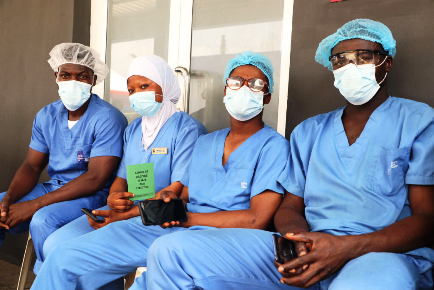The Federal Government of Nigeria has unveiled a landmark strategy to digitally transform the nation’s healthcare system, aligning with the ‘Renewed Hope’ agenda of President Bola Ahmed Tinubu’s administration. The initiative places data, technology, and interoperability at the heart of national healthcare reforms.
RELATED: Transformative role of AI and data science in advancing global health in Africa
Speaking during the Nigeria Digital Health Initiative (NDHI) National Stakeholders Meeting held on Monday, in Abuja, the Minister of State for Health and Social Welfare, Dr. Iziaq Salako, described the effort as a “decisive moment” for the future of healthcare in Nigeria. According to him, the NDHI marks a critical turning point in tackling systemic inefficiencies that have long plagued the health sector.
Launched in March 2024, the NDHI is designed to integrate Nigeria’s fragmented digital health ecosystem by building a modular, open, and interoperable digital health services network. It aims to improve healthcare outcomes by addressing the lack of real-time data access, poor system compatibility, and siloed service delivery models that currently exist across the country.
“We are moving from vision to execution,” Dr. Salako said. “Digital tools are now a necessity, not a luxury. This transformation will power everything from disease outbreak tracking and improved immunization to better health financing and job creation through health tech innovation.”
The initiative rests on three foundational pillars:
-
Interoperable Digital Health Services Network
-
Health Claims Exchange (HCX)
-
Health Information Exchange (HIE)
The Health Claims Exchange (HCX) will streamline claims management, reduce fraud, and optimize spending by offering real-time access to health data, while the Health Information Exchange (HIE) will enable secure, cross-platform data sharing across health facilities, states, and sectors, both public and private.
This integrated approach is expected to improve clinical decision-making, enhance public health surveillance, support efficient resource allocation, and stimulate private-sector innovation, particularly in the development of health apps and digital tools.
Dr. Salako emphasized the importance of including private healthcare providers, who currently deliver nearly 60% of healthcare services in Nigeria, into national health data reporting systems to build an inclusive digital health infrastructure.
“Imagine a woman delivering in rural Yobe State, with her medical records accessible from any referral center nationwide—without a single paper folder. That’s the future we are building,” he said.
The initiative, endorsed by the National Council on Health in November 2024, marks a significant shift from fragmented pilot programs to a unified, national digital health transformation strategy. Salako called on state commissioners, digital health focal persons, civil society organizations, and private stakeholders to adopt actionable timelines and work in collaboration to drive implementation.
“Let this meeting be remembered not just as a gathering, but as the launchpad for building a smarter, stronger, and more equitable health system for all Nigerians,” Salako concluded.






























